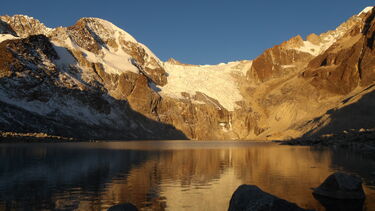Dr Jeremy Ely, Senior Lecturer in Physical Geography at the School of Geography and Planning, has been asked to write and present the policy summary for UNESCO's (2025–2034).
Endorsed by the UN, the Decade of Action is a global effort to boost research and drive urgent action to protect the cryosphere - Earth’s frozen areas - which store around 70% of the planet’s freshwater. The initiative was officially launched on 10 June 2025 at the United Nations Ocean Conference (UNOC3) in Nice, France, by President Macron of France and President Rahmon of Tajikistan.
Jeremy said: “Our frozen parts of the world, the cryosphere, are transforming rapidly due to climate change. Changes in these remote places may seem far from our everyday lives. But they are already having profound effects upon the globe and could drastically alter the climate of the UK. We are all downstream of the cryosphere. The Decade represents our final chance to mitigate losses of the cryosphere and adapt to change. It was a privilege to write and present this policy summary. Our research at Sheffield, focusing on ice sheet and glacier change, has continually improved our understanding of these pressing matters.”
Jeremy’s policy summary outlines the strategy and key milestones for the next 10 years of science and action to protect these vital areas. It stresses the importance of joining scientific progress with educators, policy makers, and the wider public. Progress is needed on monitoring, predicting and adapting to the global scale impacts of cryosphere change.
The cryosphere refers to all the parts of our planet where water is frozen as snow or ice, including polar ice sheets and sea ice, mountain glaciers, snowpacks, ice on lakes and rivers, and permafrost. This covers a huge area, around 10% of the Earth’s land, and stores around 70% of the planet’s freshwater. According to the UN, 2 billion people rely on glaciers for water and energy, and two-thirds of irrigation worldwide uses meltwater from snow and mountain glaciers. Melting of glaciers and ice sheets is causing sea levels to rise, which could displace billions of people who live close to the coast.

